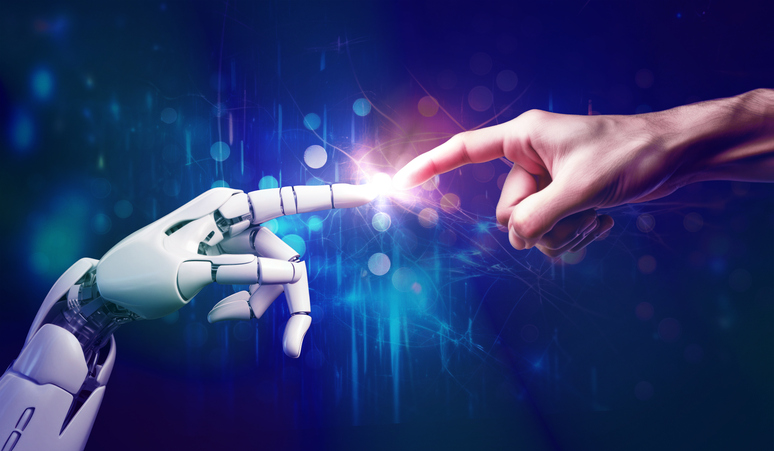The Human Touch: Integrating Emotional Intelligence in an AI-Driven Workplace

Empathy in the Age of AI: Why Emotional Intelligence Matters More Than Ever
In an era where artificial intelligence (AI) is increasingly woven into the fabric of the workplace, the role of human leaders is undergoing a significant transformation. AI has the potential to revolutionize operations, enhance decision-making, and drive efficiency. However, as AI continues to permeate the business world, the importance of emotional intelligence (EI) in leadership cannot be overstated. The harmonious integration of AI capabilities with the empathetic, nuanced understanding of human emotions is crucial for creating a balanced and effective workplace.
The Rise of Artificial Intelligence
AI technologies, ranging from machine learning algorithms to sophisticated data analytics, are becoming indispensable tools for businesses. They streamline processes, uncover insights from vast datasets, and perform repetitive tasks with precision and speed. According to a report by McKinsey, AI adoption could potentially add $13 trillion to the global economy by 2030. This proliferation of AI in various sectors signifies a paradigm shift in how work is performed and managed.
The Imperative of Emotional Intelligence
As AI takes on more cognitive tasks, leaders must pivot towards skills that machines cannot replicate—chief among them, emotional intelligence. EI involves the ability to recognize, understand, and manage our own emotions, as well as to empathize with the emotions of others. Daniel Goleman, a renowned psychologist, identified EI as a critical component of leadership, influencing everything from team dynamics to organizational culture.
Incorporating EI into leadership practices ensures that while AI handles data-driven tasks, human leaders can focus on fostering a supportive, collaborative, and innovative work environment. This dual approach leverages the strengths of both AI and EI, addressing the technical and emotional needs of the workforce.
The Intersection of AI and EI in Leadership
- Enhanced Decision-Making: AI can provide leaders with data-driven insights, predictive analytics, and trend analyses. However, interpreting these insights requires EI to consider the human impact of decisions. Leaders equipped with EI can balance analytical data with empathy, ensuring decisions are not only efficient but also ethically sound and socially responsible.
- Improved Employee Engagement: AI tools can analyze employee engagement surveys, performance metrics, and feedback to identify trends and areas for improvement. Leaders with high EI can use this information to tailor their management approaches, address concerns empathetically, and create a more engaged and motivated workforce.
- Conflict Resolution: AI can detect early signs of workplace conflicts through sentiment analysis and communication patterns. However, resolving these conflicts effectively necessitates a leader’s EI to navigate sensitive conversations, mediate disputes, and foster a harmonious workplace culture.
- Personalized Development: AI can identify skill gaps and recommend personalized training programs for employees. Leaders with EI can support these development initiatives by providing coaching, understanding individual aspirations, and creating a culture of continuous learning and growth.
Cultivating EI in AI-Driven Workplaces
For leaders to thrive in an AI-enhanced workplace, they must consciously develop and demonstrate EI. Here are some strategies:
- Active Listening: Leaders should practice active listening, ensuring they understand employee concerns and feedback fully before responding. This builds trust and shows that leaders value their team’s input.
- Empathy: Demonstrating empathy involves recognizing and validating employees’ feelings and perspectives. Leaders should strive to understand the emotional drivers behind their team’s behavior and decisions.
- Self-Awareness: Leaders must be aware of their own emotional triggers and biases. Self-awareness allows leaders to manage their reactions and maintain objectivity in decision-making.
- Relationship Management: Building strong, positive relationships with employees fosters a supportive work environment. Leaders should engage in regular, meaningful interactions with their team members.
The future of work lies in the symbiotic relationship between artificial intelligence and emotional intelligence. As AI continues to evolve and integrate into the workplace, the human touch provided by emotionally intelligent leaders becomes increasingly vital. By balancing the analytical power of AI with the empathetic and interpersonal strengths of EI, business leaders can create a dynamic and resilient workplace poised for sustained success.
In embracing this balance, leaders not only drive productivity and innovation but also cultivate a positive, inclusive, and emotionally healthy organizational culture. The convergence of AI and EI represents the next frontier in leadership, where technological advancement and human empathy coexist to elevate the workplace to new heights.
Return to all posts